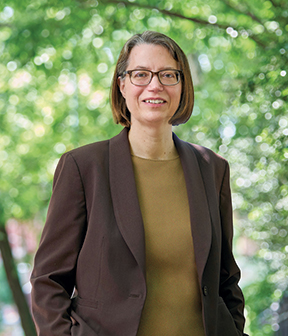Fighting for Families
Christine Gottlieb ’97 leads the Family Defense Clinic as its impact grows wider.
Christine Gottlieb ’97 has been teaching the Law School’s Family Defense Clinic (FDC) since 2002 and became the clinic’s director in 2022. Recently, she cemented her NYU Law ties even further, joining the faculty as an assistant professor of clinical law in June.
Ironically, Gottlieb observes, given her nearly quarter century as a legal clinician, it was not the school’s renowned clinical program that drew her here as a student, and she didn’t take a single clinical course. Having majored in philosophy at the University of Chicago, she came to NYU Law to study with the late Ronald Dworkin and Liam Murphy, Herbert Peterfreund Professor of Law and Professor of Philosophy. But working as a research assistant for Martin Guggenheim ’71, now Fiorello LaGuardia Professor of Clinical Law Emeritus, set Gottlieb on her current path.
Guggenheim not only founded the FDC but pioneered the field of family defense. Under that approach, in representing parents—for example, those with children in or at risk of entering foster care—the broader goal is pushing back against excessive government intervention in the lives of families and keeping families intact whenever possible. The practice is multidisciplinary, employing social workers to engage with government agencies in order to reduce the time that children spend in foster care and to safely return them to their homes.
Following a stint as a staff attorney in the Legal Aid Society’s juvenile rights division and a clerkship on the US Court of Appeals for the Fifth Circuit, Gottlieb worked with Guggenheim as the FDC co-director and became the director of the clinic after he retired. Gottlieb, says Guggenheim, “is the ideal clinical law professor. Students have always loved her because of her ability to work closely with them and offer them the perfect blend of guidance while letting them figure it out on their own.” There is, he says, “no one in the country I would rather have seen replace me in the Family Defense Clinic than Chris.”
Gottlieb says the clinic will continue to focus on its core mission of training law students and social workers to represent parents and keep families together. But she also notes that in recent years there has been a growing awareness that “the so-called child welfare system—many of us now call it the family regulation or family policing system—is dangerous and oppressive and is harmful to families and racially unjust.” This requires more systemic change, she says—which the clinic has already begun pursuing through legislation and litigation of test cases that are designed to shift the law.
In 2022, the clinic overturned a precedent that made it difficult for out-of-state parents to gain custody of their children who had been placed in New York’s foster care system . This past year, students helped file the clinic’s first class action, which challenges illegal home searches by child protective agents. Pending legislation that the clinic helped draft includes the Anti-Harassment in Reporting bill, currently under consideration in the New York state legislature, which would prevent anonymous reports that trigger invasive investigations of families. “People currently use the reporting system to harass, and the investigations are often quite harmful to parents and children,” Gottlieb says.
Like other members of the clinical faculty, Gottlieb combines practice and scholarship. In a recent paper in Cardozo Law Review, she argued that the US Supreme Court’s opinion in Fulton v. City of Philadelphia, a 2021 ruling that allowed a religious organization to deny foster care certification to same-sex couples, is built upon misconceptions about the foster care system and its aims. She has also examined the racial justice implications of the res ipsa loquitur doctrine in child welfare cases, which is often used to find parents culpable of abuse in the absence of direct evidence of who committed the abuse.
“Chris’s scholarship reflects a profound understanding of the nuances surrounding parental rights termination and a commitment to serious study of the field,” said Dean Troy McKenzie ’00 in announcing that Gottlieb would join the full-time faculty. When she’s not working, Gottlieb says, she can often be found attending the baseball games of her two teenage sons, both of whom are pitchers. Does Gottlieb herself play sports? “Not so much, honestly,” she says. “Unless you consider litigation a blood sport, which some do.”
Posted September 10, 2024


